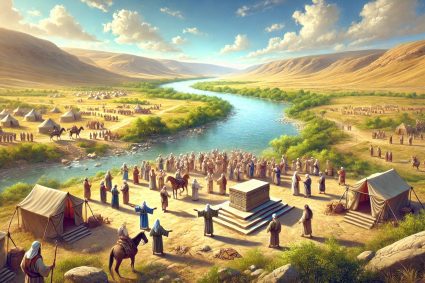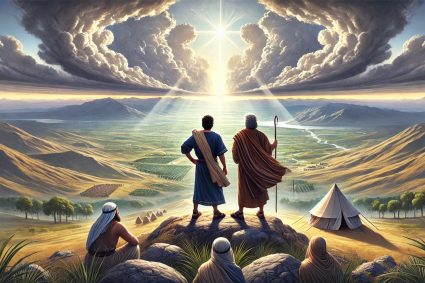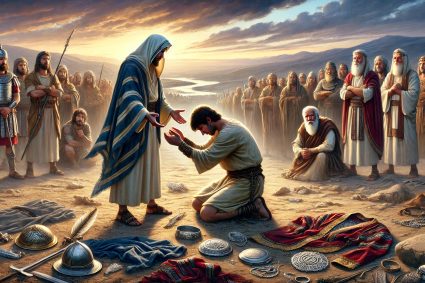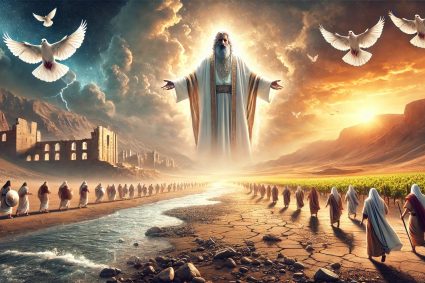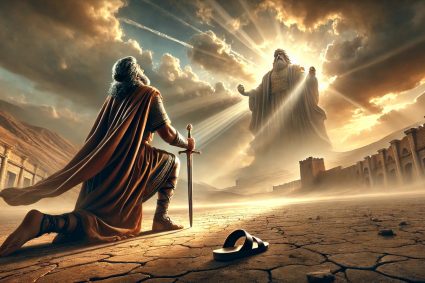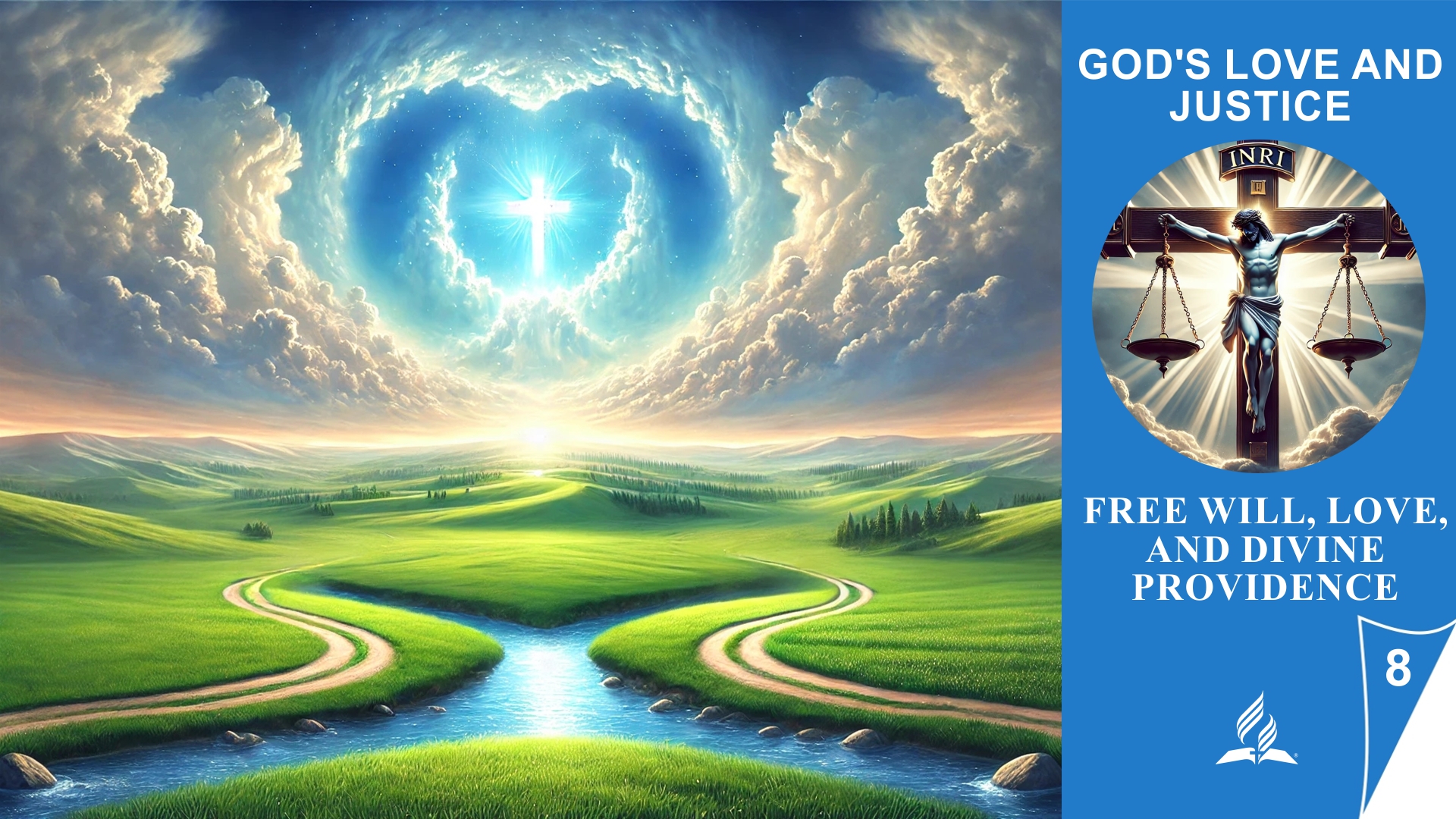
Series THE GOD OF LOVE AND JUSTICE with Pastor Mark Finley |
Lesson 8.Free Will, Love, and Divine Providence |
Free Will, Love, and God’s Work in the World |
The question of God’s sovereignty and human free will is central to understanding love, suffering, and divine providence. If God is all-powerful, why does He allow evil to exist? The Bible shows that God’s will is not always fulfilled because He grants humanity true freedom—a freedom that allows for both love and rejection. At the same time, despite human choices, God continues to work in history to accomplish His good plan. In Christ, He has already achieved victory, and in the end, His ideal will shall be fully realized. This lesson invites us to understand God’s actions and trust Him despite all challenges.
Memory Text: John 16,33 – “ ‘These things I have spoken to you, that in Me you may have peace. In the world you will have tribulation; but be of good cheer, I have overcome the world’ ”
Content:
8.1 Our Sovereign God
God’s Will and Human Decisions
The idea that everything happens exactly as God wills raises deep theological problems—especially regarding suffering and evil in the world. However, the Bible shows that God’s will is not always fulfilled because humans often choose differently in their freedom. Psalm 81:12–15 and other passages illustrate that God desires a different fate for His people, yet despite His longing for obedience, they often follow their own paths. A theology that attributes everything directly to God’s will could make Him responsible for evil, contradicting His character of love and justice. Instead, the Bible reveals a God who grants humans freedom, even when their choices go against His ideal. This presents the challenge of reconciling God’s sovereignty with human free will.
8.2 Pantokrator
God’s Omnipotence and Human Freedom
God’s omnipotence does not mean that He forces everything to happen, but rather that He has the power to do everything that aligns with His nature and plan. The Bible shows that God intervenes and performs miracles, yet He still respects human free will. Although He desires to save all, not everyone chooses Him—an indication that His power does not override the free will of His creatures. This reveals a deeper dimension of His rule: a power not based on coercion but on love and justice. God’s omnipotence is thus demonstrated not only in His ability to act but also in His willingness to allow human choice. This is the true greatness of His reign—one that embraces both absolute power and self-restraint.
8.3 To Love God
Love Cannot Be Forced
God desires that all people love Him, but true love can only be given freely. If God were to force love, it would cease to be love and become mere compulsion. The Bible shows that God grants humans free will—to love Him or to turn away from Him—a freedom that comes with great responsibility and serious consequences. Since God has committed Himself to respecting free will, this also means that much happens that does not align with His desires. This highlights the weight of human choices and the serious responsibility that comes with true freedom. The way we use this freedom reveals whether we choose God’s love or turn away from Him.
8.4 God’s Ideal and Remedial Wills
God’s Plan: Freedom and Restoration
God does not predestine who will be saved or lost but plans the future while considering human free choices. His “ideal will” describes what He desires for the world—a life of love and fellowship with Him. Yet, since humans often choose differently, God works through His “healing will,” creating ways to save people and bring about good despite wrong choices. This perspective unites God’s sovereignty with human freedom, without Him forcefully controlling history. Romans 8:28 gives us hope: even in difficult times, God can turn everything for good. This truth shows that God’s plan is not dependent on our failures but is always directed toward healing and redemption.
8.5 Christ Has Overcome the World
Hope Despite Suffering: Christ Has Won
Jesus does not promise an easy life but warns that we will face trials in this world. However, He gives us a crucial hope: He has overcome the world (John 16:33). This means that evil and suffering do not have the final word—God’s ultimate plan is the restoration of His ideal will. While we live in a world shaped by free, often wrong choices, God still works and brings good out of difficult circumstances. Our trials are not a sign that God has abandoned us but a reminder that we are in the midst of a great cosmic battle. By holding on to Christ, we can be assured that His victory is also our victory.
8.6 Summary
God’s Sovereignty and Human Free Will
God is all-powerful, yet He does not force anyone to love Him or do His will—genuine love and obedience require freedom. While God has an ideal plan for the world, His providence takes into account human choices, even when they go against His will. Evil does not exist because God wills it but because His creatures have the freedom to reject Him. Still, God guides history through His “healing will” toward a good outcome and works for the good of His children even in difficult circumstances. In Christ, He has already triumphed over evil, and we can trust that His final plan of restoration will be fulfilled. Despite trials, we can live in the certainty that God will never abandon us but will bring everything to a good end.
(Visited 48 times, 1 visits today)

